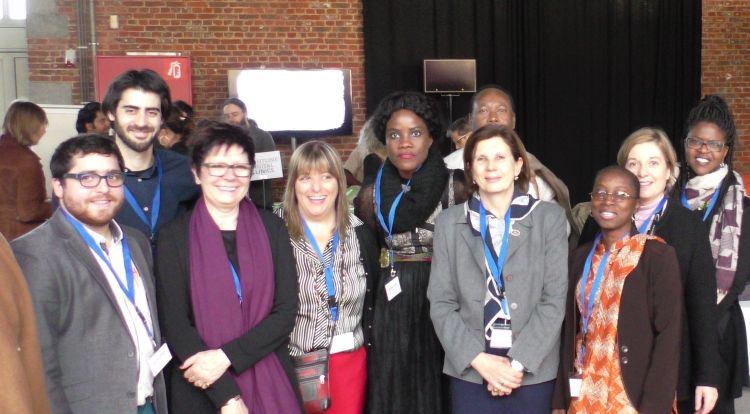The subject matter was divided into three topics: Enabling Environments for CSOs, working with CSOs at grass root level, EU instruments for civil society and human rights. Many sessions that fell within these three categories were held with panels comprising of a mix of institutional and CSO representatives.
Notable talks included ‘Funding for Civil Society and Human Rights: Up or Down?’, ‘the future of EU-ACP relations: what role for non-state actors?’, ‘GSP+ and free trade agreements: CSO participation in EU trade instruments’. In the first of these, the growing importance of ownership in the face of an increasingly donor-driven approach was stressed as well as a call for the simplification of processes. In the ‘the future of EU-ACP relations: what role for non-state actors?’, the focus was on the post-Cotonou agreement. A debate on the legally-binding nature of such an agreement came up, it was said that a legally binding nature would reaffirm the role of CSOs as accountability checkers. The talk entitled ‘GSP+ and free trade agreements: CSO participation in EU trade instruments’ was framed by the fact that pluralist and open societies are more prosperous. In this perspective it was suggested that the EU can have a leading role, in particular on integrating legally binding social requirements within international free-trade agreements. Panellist Sergi Corbalan from the Fair Trade Adcvocacy Network, suggested for instance that specific supply chains be provided for companies that respect workers’ rights.
Diego López-González from ITUC/TUDCN featured on the panel entitled ‘Measuring the enabling environment: synergies and challenges’. He highlighted different contributions from CSOs (and specifically trade unions) to measuring the enabling environment. The 8 Istanbul principles on effective development cooperation and the trade union principles on development effectiveness were outlined. Mr. López-González emphasised the contribution of these instruments, as well as of indexes such as ITUC’s global rights index, to accountability. The common ground between Agenda 2030 and the multi-stakeholder approach to enabling environment was put forward through the relevance of social dialogue to the SDGs :
“With regard to ending poverty, contributing to gender equality and reducing inequalities (goals 1, 5 and 10), social dialogue has been important in promoting social protection policies but also in ensuring social security. We have the examples of Uruguay and Indonesia where national social security laws were developed through tripartite structures that contributed to including broader parts of the population in the national social security system. Social dialogue structures have also contributed to establishing minimum living wages which are essential to ending poverty and reducing inequality. With respect to goal 8 on decent work and sustainable inclusive economic growth, social dialogue is obviously one of the four pillars of the decent work agenda, together with rights at work, social protection and employment creation. It is also an element of ownership of the social factors of the economic agenda by employers and workers. It has contributed to promoting inclusive and sustainable economic growth through fostering demand for policies building onto the demand side of the economic agenda by the social actors, employers and workers. It has contributed to promoting inclusive and sustainable economic growth through fostering policies building onto the demand side of the economy. With respect to goal 16, building peaceful and inclusive societies, we consider that social dialogue is a governance mechanism that contributes to freedom of association and the democratisation of societies. We have concrete examples, that of Tunisia for example, where the Nobel peace prize was awarded to the Tunisian quartet which, through social dialogue contributed to ameliorating the national context.”
The closing plenary highlighted the continued need for EU involvement in promoting global human and social rights. A disquieting testimony by Pierre Clavier Mbonimpa of the situation in Burundi, made it clear to all those present that a reaffirming commitment to the freedom of speech and civil liberties that had real impacts on people’s lives was required.


